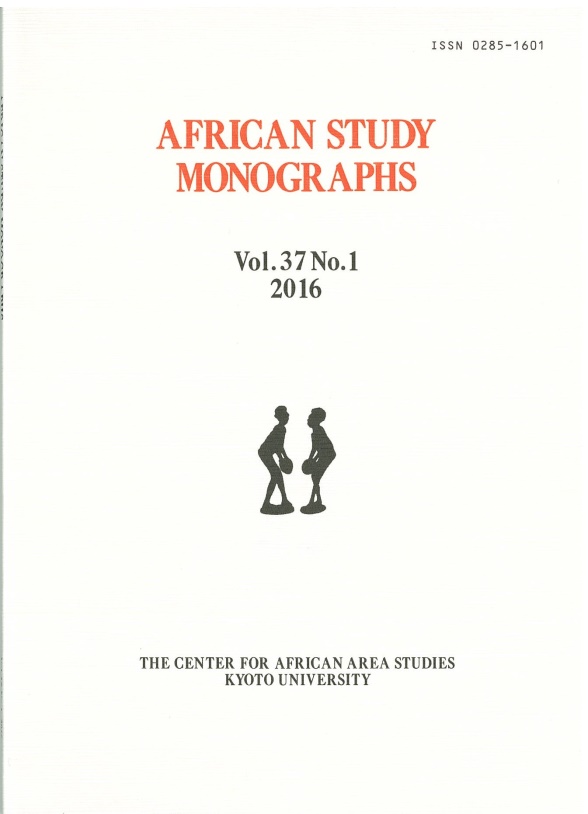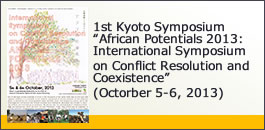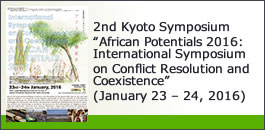Date: July 2, 2011
Venue: Inamori Foundation Memorial Hall (Inamori Center), Kyoto University
Contents
The greatest obstacles facing modern African society are the impoverishment and disintegration of the social order caused by conflict. In particular, since the 1990s, large-scale civil wars and regional strife have erupted regularly, and multifarious conflicts have been occurring, such as violent clashes over land ownership and use, as well as territorial disputes over political resources. The international society has been seeking a solution to this state of affairs according to the normative values and concepts that originated in the U.S. and Europe, such as liberal democracy.
In response to these issues, our workshop takes an entirely different stance, namely, that the knowledge and institutions created, developed, and employed by African people can also serve to achieve conflict resolution and a state of coexistence. However, such knowledge and institutions are not fixed and unchanging entities within Africa. Rather, they have grown out of Africa’s repeated interaction, both consonant and dissonant, with the outside world. This workshop will strive to consider avenues for leveraging Africa’s knowledge and institutions in order to resolve current disputes and recover a cohesive social structure.
Keywords
Peace-building, Nation-building, Post-conflict, Rwanda, South Sudan
Program
3:30-13:45 Itaru Ohta (Kyoto Unversity)
Introduction
13:45-14:45 Eisei Kurimoto (Osaka University)
Unrestored Peace at the Community Level: Challenges and Limits of Peace-Building in “Post-War” Southern Sudan
14:45-15:00 Break
15:00-16:00 Shinichi Takeuchi (JICA Research Institute)
Rwanda’s Gacaca under Post-Genocide State-Building
Report Overview
Itaru Ohta (Kyoto Unversity)
Introduction
This workshop is a 5-year research project, officially titled “A Comprehensive Regional Study on Conflict Resolution and Coexistence through Leveraging Africa’s Potentials,” which started in academic year 2011 (also the foundational year of the JSPS’s Grants-in-Aid for Scientific Research [S]). Ohta, the representative of the project, explained outline of the project. Modern African society is confronting the formidable obstacles of impoverishment and disintegration of the social order caused by conflict. Ohta argued that in the face of these real-life challenges, instead of importing Western systems and values to the African continent, this project seeks to clarify new avenues for effectively utilizing the knowledge and institutions created, accumulated, and employed by African people (“African Potentials”) such that they can be used to contribute to conflict resolution and social order construction (co-existence). (Reporter: Itaru Ohta)
Eisei Kurimoto (Osaka University)
Unrestored Peace at the Community Level: Challenges and Limits of Peace-Building in “Post-War” Southern Sudan
The second speaker, Kurimoto, talked about the peace-building in “post-war” southern Sudan. Ever since the signing of the 2005 Sudanese Comprehensive Peace Agreement, the government forces and the Sudan People’s Liberation Army (SPLA) have been maintaining peace in southern Sudan (which is scheduled to become independent in July 2011). However, peace at the community level has not been accomplished, and armed conflicts are erupting not only between different communities but also within communities. Although peace discussions are held in certain areas to promote reconciliation at the community level, the results have not been substantive. Furthermore, other regional areas exist where no such initiative has been taken at all. In order to rebuild the society, it is essential to follow “peace from below” approaches that focus on endogenous, community-level peace initiatives, and also organically join these movements with “peace from above” that is implemented by government agencies.
During the question-and-answer session, discussion was generated from questions that included, “What specifically needs to be done to support ‘peace from below’ activities?”; “Who will conjoin the ‘peace from below’ and ‘peace from above’ movements, and how will they do that?”; and “Isn’t it necessary to stimulate business activity on a more individual level rather than just holding peace conferences?” (Reporter: Toru Sagawa)
Shinichi Takeuchi (JICA Research Institute)
Rwanda’s Gacaca under Post-Genocide State-Building
The third speaker, Takeuchi, talked about Rwanda’s post-conflict state-building. On the basis of the World Bank’s governance indexes of “political stability” and “voice and accountability,” three types of post-conflict state-building were distinguished: (1) where both indexes were stagnant (e.g., Afghanistan, Sudan), (2) where the “political stability” index considerably exceeded the “voice and accountability” index (e.g., Rwanda, Angola), and (3) where both indexes showed parallel improvement (e.g., Sierra Leone, Burundi). Regarding the post-conflict state-building, the international community has emphasized the necessity of enhancing not only the state capacity of providing basic social services including security, but also state legitimacy vis-à-vis the society. Among the above-mentioned three types, the first two clearly indicate a gap between the goals promoted by the international community and actual status of state-building. While the type (1) shows the lack of state capacity for the provision of security, the type (2) demonstrates a risk of the authoritarian state-building, which may damage the state legitimacy. In fact, a propensity toward authoritarianism among countries that have experienced serious internal conflict has been so far observed. Examining the experiences of post-conflict state-building in Rwanda, Takeuchi indicated its achievements and challenges. On the one hand, the country has succeeded in maintaining social order under the rule of the Rwandan Patriotic Front, the former rebel led by ethnic minority. On the other hand, the priority of political stability may have hampered the enhancement of liberal democratic governance. Inclusiveness in the governance as well as economic development should be consciously taken into account in its state-building process
During the question-and-answer session, debate centered on the differences in the post-conflict societies in Rwanda and Burundi, the manner in which the conflicts ended, and the great relevance of the degree of involvement of the international society. (Reporter: Shuichi Oyama)







 Exploring African Potentials, Mila Special Issue
Exploring African Potentials, Mila Special Issue
